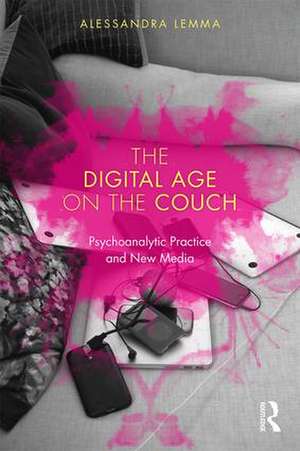The Digital Age on the Couch: Psychoanalytic Practice and New Media
Autor Alessandra Lemmaen Limba Engleză Paperback – 27 apr 2017
The Digital Age on the Couch seeks to understand more about how new technologies interact with the prerogatives of an individual’s internal world, how they may alter psychic structure itself in fundamental ways and the implications this may have for the individual’s functioning and for the operation of society. This book attempts, from the perspective of a working clinician, to make some sense of this. The impact of mediation via technology and the consequent disintermediation of the body represent central themes throughout, as they impact on the experience of embodiment, on the ‘work of desire’ and on the way new media influences psychoanalytic practice.
New media offer opportunities for increasing accessibility to mental health care, including psychoanalytic interventions. However, this requires a sophisticated understanding of how to best create and safeguard the analytic setting. Alessandra Lemma here guides the clinician through an exploration of the limitations and risks of mediated psychotherapy, illustrated with clinical examples throughout.
The Digital Age on the Couch offers an accessibly written guide to combining existing psychoanalytic theory and practice with the challenges presented by digital media. It will appeal to psychoanalysts, psychoanalytic psychotherapists and counsellors.
| Toate formatele și edițiile | Preț | Express |
|---|---|---|
| Paperback (1) | 231.55 lei 3-5 săpt. | +9.09 lei 5-11 zile |
| Taylor & Francis – 27 apr 2017 | 231.55 lei 3-5 săpt. | +9.09 lei 5-11 zile |
| Hardback (1) | 966.84 lei 6-8 săpt. | |
| Taylor & Francis – 28 apr 2017 | 966.84 lei 6-8 săpt. |
Preț: 231.55 lei
Preț vechi: 243.74 lei
-5% Nou
Puncte Express: 347
Preț estimativ în valută:
44.31€ • 46.09$ • 36.58£
44.31€ • 46.09$ • 36.58£
Carte disponibilă
Livrare economică 24 martie-07 aprilie
Livrare express 08-14 martie pentru 19.08 lei
Preluare comenzi: 021 569.72.76
Specificații
ISBN-13: 9780415791137
ISBN-10: 0415791138
Pagini: 164
Dimensiuni: 156 x 234 x 19 mm
Greutate: 0.25 kg
Ediția:1
Editura: Taylor & Francis
Colecția Routledge
Locul publicării:Oxford, United Kingdom
ISBN-10: 0415791138
Pagini: 164
Dimensiuni: 156 x 234 x 19 mm
Greutate: 0.25 kg
Ediția:1
Editura: Taylor & Francis
Colecția Routledge
Locul publicării:Oxford, United Kingdom
Public țintă
Postgraduate, Professional, and Professional Practice & DevelopmentCuprins
Introduction This Modern Life
Part 1: Outside In
Chapter 1 Imagined Embodiments, Lived Embodiments
Chapter 2 The Black Mirror: Becoming Sexual in the Digital Age
Chapter 3 The Disintermediation of Desire: From 3D(esire) to 2D(esire)
Part 2: Inside Out
Chapter 4 Mediated Psychotherapy
Chapter 5 Digital Transference and the Therapist’s Anonymity
Conclusion
Part 1: Outside In
Chapter 1 Imagined Embodiments, Lived Embodiments
Chapter 2 The Black Mirror: Becoming Sexual in the Digital Age
Chapter 3 The Disintermediation of Desire: From 3D(esire) to 2D(esire)
Part 2: Inside Out
Chapter 4 Mediated Psychotherapy
Chapter 5 Digital Transference and the Therapist’s Anonymity
Conclusion
Notă biografică
Alessandra Lemma is a Fellow of the British Psychoanalytical Society and Consultant - Clinical Psychologist at the Anna Freud National Centre for Children and Families. She is Honorary Professor of Psychological Therapies at the School of Health and Human Sciences at Essex University and Visiting Professor, Psychoanalysis Unit, University College London where she is also the Clinical Director of the Psychological Interventions Research Centre. She is Visiting Professor, Istituto Winnicott, Sapienza University of Rome and 'Centro Winnicot', Rome. She is the Editor of the New Library of Psychoanalysis book series (Routledge) and one of the regional Editors for the International Journal of Psychoanalysis. She has published extensively on psychoanalysis, the body and trauma.
Recenzii
"Whenever one reads Alessandra Lemma one can always expect to be confronted with original and unexpected viewpoints. She is both a classical and post-modern psychoanalyst who, with clinical acumen and theoretical rigor, never abandons the mainstream of psychoanalysis. Professor Lemma explores contemporary questions with the depth and breadth of direct clinical experience. This latest offering examines psychoanalysis in times of techno-culture - an essential read for all clinicians as we grapple with this new reality, which is not only in the everday lives of all of us, but is also very present in our clinical practices."-Vincenzo Bonaminio, Adjunct Professor, Department of Child and Adolescent Psychiatry, Sapienza, University of Rome, Training and Supervising Analyst of the Italian Psychoanalytic Society and of the IPA, Director, "Winnicott Centre" of Rome.
"Alessandra Lemma has a way of identifying and capturing the core of modern culture. We cannot understand our patients, the people around us or indeed ourselves without understanding better how we have individually and socially adapted to the digital world. This is the essential journey that Lemma takes us on, in an inspiring, beautifully written and moving voyage of exploration. This book is an essential guide for every clinician working with every patient."-Peter Fonagy, Professor of Contemporary Psychoanalysis and Developmental Science, UCL.
"Alessandra Lemma has a way of identifying and capturing the core of modern culture. We cannot understand our patients, the people around us or indeed ourselves without understanding better how we have individually and socially adapted to the digital world. This is the essential journey that Lemma takes us on, in an inspiring, beautifully written and moving voyage of exploration. This book is an essential guide for every clinician working with every patient."-Peter Fonagy, Professor of Contemporary Psychoanalysis and Developmental Science, UCL.
Descriere
The Digital Age on the Couch seeks to understand more about how new technologies interact with the prerogatives of an individual’s internal world, how they may alter psychic structure itself in fundamental ways and the implications this may have for the individual’s functioning and for the operation of society. This book attempts, from the perspective of a working clinician, to make some sense of this. The impact of mediation via technology and the consequent disintermediation of the body represent central themes throughout, as they impact on the experience of embodiment, on the ‘work of desire’ and on the way new media influences psychoanalytic practice.
